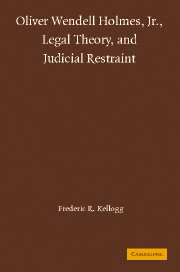Book contents
- Frontmatter
- Contents
- Preface
- 1 A Time for Law
- 2 Playing King: Connections and Misconceptions
- 3 Holmes's Conception of Law
- 4 Common Law Theory Revisited
- 5 Holmes and Legal Classification
- 6 The General Theory of Liability
- 7 Morals and Skepticism in Law
- 8 Judges, Principles, and Policy
- 9 Common Law Constitutionalism
- 10 Holmes's Theory in Retrospect
- 11 Conclusion
- Appendix
- Bibliography
- Index
2 - Playing King: Connections and Misconceptions
Published online by Cambridge University Press: 24 July 2009
- Frontmatter
- Contents
- Preface
- 1 A Time for Law
- 2 Playing King: Connections and Misconceptions
- 3 Holmes's Conception of Law
- 4 Common Law Theory Revisited
- 5 Holmes and Legal Classification
- 6 The General Theory of Liability
- 7 Morals and Skepticism in Law
- 8 Judges, Principles, and Policy
- 9 Common Law Constitutionalism
- 10 Holmes's Theory in Retrospect
- 11 Conclusion
- Appendix
- Bibliography
- Index
Summary
What intellectual fun all of this is! It explains why first-year law school is so exhilarating, because it consists of playing common-law judge, which in turn consists of playing king – devising, out of the brilliance of one's own mind, those laws that ought to govern mankind. How exciting! And no wonder so many law students, having drunk at this intoxicating well, aspire for the rest of their lives to be judges.
Supreme Court Justice Antonin Scalia, A Matter of Interpretation (1997)On a December day in 1882, Oliver Wendell Holmes, Jr., at forty-one, was at lunch in Cambridge, Massachusetts, with a colleague on the faculty of Harvard Law School. He had recently published a book, The Common Law. It was the culmination of fifteen years of effort, including numerous scholarly essays and a grueling revision of the leading American legal encyclopedia, Kent's Commentaries on American Law. His scholarship had been mixed with work as a private lawyer, half of them bachelor years of evening and weekend conversation with friends such as the James brothers, William and Henry, and a long visit to England in 1866. His wedding to Fanny Dixwell in June 1872 was curtly noted along with new editorial responsibilities in a diary devoted mainly to his reading and writing. (“June 17. Married[.] sole editor of Law Rev. July no. et seq.”).
The book had gained the serious attention Holmes longed for. It had received highly respectful reviews by American journals, albeit traced with caution.
- Type
- Chapter
- Information
- Publisher: Cambridge University PressPrint publication year: 2006



